China’s Biotech Boom: From Lab to Global Market

Gene therapy, precision medicine, and biotech startups are Beijing’s next frontier industries.
The Next Growth Engine
China’s economic playbook is shifting. After decades of growth fueled by manufacturing and property, Beijing is betting on biotechnology as the next frontier industry. From gene therapies and vaccines to precision medicine and digital health platforms, China’s biotech sector is growing at a pace rivaling its advances in AI and semiconductors.
In 2022 alone, Chinese biotech startups raised over $20 billion in venture funding, making the sector one of the hottest investment themes despite global market headwinds. For Beijing, biotech is not only about commercial success but also about national security in healthcare.
Policy Support and National Strategy
Biotech has been officially written into China’s Five-Year Plans, with strong state backing. Programs encourage drug innovation, genomic research, and biomanufacturing. Local governments offer subsidies, while national regulators have streamlined drug approval processes to shorten time-to-market.
These efforts aim to reduce reliance on foreign pharmaceuticals, a vulnerability exposed during the COVID-19 pandemic. The goal is clear: build a globally competitive biotech industry that can rival the U.S. and Europe.
Startups and Unicorns
Dozens of Chinese startups are emerging as serious contenders in areas such as cell therapies, antibody drugs, and genetic sequencing.
- BeiGene and Innovent Biologics are already exporting cancer treatments globally.
- WuXi AppTec provides contract research and manufacturing services to the world’s largest drugmakers.
- New entrants, often led by scientists returning from U.S. or European labs, are focusing on rare diseases, AI-powered drug discovery, and bioinformatics.
This “reverse brain drain” top talent leaving Western pharma for Chinese startups underscores the sector’s growing appeal.
Precision Medicine and AI
China’s huge population and extensive health databases give it an edge in precision medicine. With access to millions of patient records and genomic samples, startups are building AI-driven platforms to tailor treatments to individuals.
AI models are being trained to predict drug efficacy, optimize clinical trial design, and even propose new molecular structures. This fusion of AI and biotech is one of the most promising intersections in China’s innovation landscape.
Financial and Market Dynamics
The biotech boom has also attracted global investors. Hong Kong’s stock exchange created special rules to allow pre-revenue biotech IPOs, drawing listings from dozens of Chinese firms.
Domestically, biotech startups benefit from state-led funding pools and venture capital willing to take long-term bets. Some firms are experimenting with digital financing tools to support expensive clinical trials, including blockchain-based systems for cross-border research collaboration. These mechanisms ensure faster fund transfers between labs and investors an example of how fintech quietly supports science.
Global Expansion and Tensions
Chinese biotech firms are increasingly targeting global markets. BeiGene, for instance, has partnerships with U.S. and European pharma giants, while others are expanding into Southeast Asia, Africa, and Latin America.
Yet geopolitical tensions complicate matters. The U.S. has tightened scrutiny of Chinese biotech firms over data security and supply chain concerns. Access to advanced equipment and collaborations with Western universities face increasing hurdles.
Challenges Ahead
Despite rapid progress, China’s biotech sector faces obstacles:
- Regulatory credibility: Global markets demand strict data transparency, where Chinese firms must prove reliability.
- Capital intensity: Biotech requires billions in R&D with long timelines before profitability.
- Talent bottlenecks: While returnees bring expertise, domestic training pipelines still lag behind the U.S. in certain fields.
Without addressing these, scaling globally will remain challenging.
Outlook: From Lab to Global Market
China’s biotech boom represents more than just an industry shift it is a strategic reorientation of the economy toward innovation-driven sectors. With state backing, massive datasets, and a growing pool of scientists, China is poised to become a biotech powerhouse.
The global race in biotech will not have a single winner. Instead, multiple hubs in the U.S., Europe, and Asia will compete and collaborate. China’s role is likely to expand, making it impossible to ignore in the future of medicine. For global readers, the lesson is clear: the next generation of drugs, therapies, and genomic tools may increasingly come from labs in Beijing, Shanghai, and Shenzhen, not just Boston or Basel.





